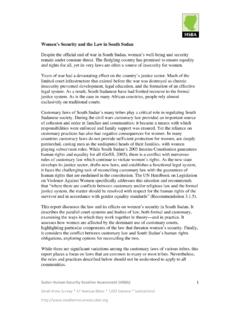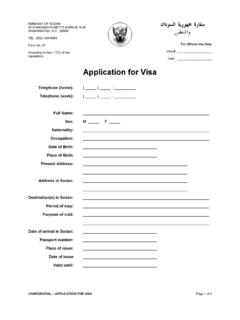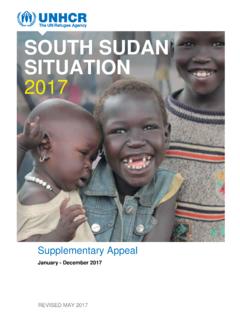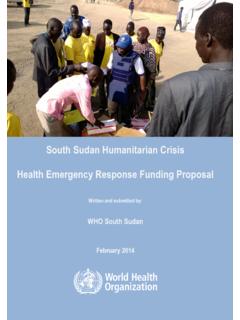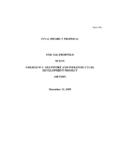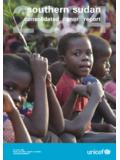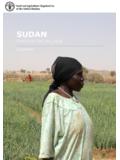Transcription of South Sudan: the CoSt of War - frontier …
1 South sudan : the CoSt of War An estimation of the economic and financial costs of ongoing conflictFrontier Economics frontier Economics is one of Europe s leading economic consultancies, and is part of the frontier Economics network, which also includes a separately owned company based in Australia. We apply advanced economic analysis to help clients make better decisions, improve performance, and keep ahead of the for Peace and Development Studies (CPDS) at the University of JubaThe Centre for Peace and Development Studies (CPDS) was established in 1997 as an academic entity within the University of Juba. The Centre serves as a forum for interdisciplinary study, research, teaching and training and public dialogue on conflict, peace and development issues related to South sudan , the Horn of Africa, the Great Lakes region, the African continent and the for Conflict Resolution (Uganda) CECORE is a Ugandan non-profit making organization initiated in 1995, with programmes in Uganda, the Great Lakes Region and the Horn of Africa.
2 CECORE s purpose is to empower individual women and men, communities, organizations and institutions to transform conflict effectively by applying alternative and creative means in order to promote a culture of active tolerance and report was prepared by frontier Economics in collaboration with the Center for Conflict Resolution (CECORE) and the Centre for Peace and Development Studies (CPDS).CONTENTSFOREwORD 4 ExECUTivE SUmmaRy 5 Key findings 5 Recommendations in summary 61 iNTRODUCTiON 8 Background and context 8 Objectives of this report 82 aPPROaCh aND mEThODOlOgy 9 Overview 9 macroeconomic costs 103 RESUlTS 11 macroeconomic costs for South sudan 11 macroeconomic costs - Regional effects 14 South sudan s informal economy and regional ties 15 Direct financial costs 15 wider costs 194 CONClUSiONS 205 RECOmmENDaTiONS 21 REFERENCES 24 ENDNOTES 25 FOREwORDThe killings, destruction and mayhem afflicting the people of this newly independent African state are deeply distressing.
3 It grieves many of us and shatters our hopes. At a personal level, achieving peace and stability for the people of South sudan has been almost a life-time endeavour. As an ambassador of Tanzania in the early 1960s, and through my tenure as a Permanent Representative at the United Nations, as Minister of Foreign Affairs and Prime Minister, and later throughout my extended term as Secretary-General of the African Continental organisation, the South sudan question has been of primary concern. After all the efforts invested by Africa, it is disheartening to observe over the last year that thousands of South Sudanese people have been killed and almost 2 million have fled their homes to escape the scourge of war. Women have been raped and even children have been recruited as painful is that this death toll and destruction has been the result of the comrades in arms of yesterday turning on each other to become the enemies of today.
4 Should they continue on this course, the leaders of the warring parties will also bear primary responsibility for shattering the bonds that have united the people of South sudan in their long struggle for freedom. Despite great efforts by Africa and the international community to end this senseless war, the tragedy continues, at massive cost. No monetary figure or economic projection can quantify the full human cost of this conflict. There can be no price tag on the suffering of South sudan s people from displacement, famine and death. But it is possible to assess the direct economic costs by estimating the loss of productive assets and capital, the reduction in economic activity, and the domestic diversion from productive to non-productive activities. The costs are equally severe for neighbouring countries and the international community at large including, in this case, the likely decline in formal trade flows with South sudan s neighbours, and the cost of providing humanitarian aid and UN peacekeepers for years to this important report, frontier Economics, in collaboration with the Center for Conflict Resolution and the Centre for Peace and Development Studies at Juba University, lay out the results of their sophisticated economic modelling to begin to calculate just what the direct economic costs are likely to be for the economy of South sudan , its neighbours and the wider international community.
5 Their conclusions are on the intensity of the conflict, the costs for South sudan could reach a staggering range of between US$22 billion and $28 billion over the next five years. But if action is taken now to ensure peace is achieved in 2015 (rather than 2020), the international community, particularly Western donors, could save about US$30 billion by reducing expenditure on peacekeeping and humanitarian assistance. This scenario would also mean that the neighbouring economies of Ethiopia, Kenya, sudan , Tanzania and Uganda could collectively save US$53 billion. Elsewhere in Africa, bitter rivals were able to overcome their differences to establish governments of national unity and tackle the root causes of conflict. I firmly believe that it is possible for political leaders in South sudan , the region and the international community to work together to attain a negotiated and enduring solution to this conflict.
6 But countries with leverage over the parties to the conflict in the region and beyond must lead the shedding light on the wider costs of the war, it is my sincere hope that this report will focus the minds of political leaders on the stakes of failing to bring immediate and lasting peace to South sudan . When compared with the potential cost of continued conflict, maximal efforts towards a negotiated political solution to this conflict seem a small price to Salim ahmed SalimFormer Minister of Foreign Affairs, Minister of Defence, Prime Minister of the United Republic of Tanzania and Secretary General of the Organisation of African sudan : ThE COST OF waRExECUTivE SUmmaRyThe conflict in South sudan since December 2013 has devastated the lives of the majority of South sudan s people. It has killed tens of thousands, placed nearly a third of the population at risk of famine and ravaged key parts of the country.
7 The conflict has been brutal: killings, rape, forced recruitment of children, mass displacement and the destruction of livelihoods. It has left open wounds that will take decades to heal. The economic costs of the conflict to date are substantial, with a projected drop of 15% in South sudan s GDP for 2014. This report looks forward from January 2015 to quantify the additional economic costs that would be incurred by South sudan , other countries in the neighbouring region, and the wider international community, should the conflict continue. By viewing the conflict through this economic lens, the findings of this report likely understate the cost of war in South sudan . The full effects of conflict, such as environmental degradation, the break-down of social cohesion, and the psycho-social trauma generated by sexual violence and child exploitation, are difficult to capture in their entirety in an economic cost benefit analysis.
8 South sudan can ill-afford the economic costs of war, but after decades fighting for independence from its northern neighbour, it is even less equipped to bear the heavy social costs of another generation growing up in a violently divided society. The longer the violence continues, the further it spreads, and the more insidious it becomes, the more difficult the task will be for South sudan to undergo the kind of social, psychological and economic transformation needed to achieve lasting peace. Key findingsA central finding of this report is the need for early action. The costs of conflict to South sudan , its neighbours and the international community are likely to increase at an accelerating rate the longer the conflict findings for South sudan : If the conflict1 continues for another 1 to 5 years, it will cost South sudan between US$ billion and $28 billion.
9 If the conflict s effects are measured over 20 years to allow for flow-on effects, the loss is even greater: between $122 billion and $158 billion. The human costs of conflict death, hunger and disease also have significant longer term economic impacts. Just taking the effects of hunger on labour productivity could mean a further $6 billion in lost GDP2 if the conflict were to last another 5 years. South sudan s spending on security could increase by a further $ billion were the conflict to last another 5 The savings in military spending that would result from resolving the conflict within a year from now would allow South sudan to meet the internationally recommended target of allocating 20% of spending to findings for the region: The five countries considered in this report Ethiopia, Kenya, sudan , Tanzania, and Uganda could between them save up to $53 billion if the conflict were resolved within 1 year, rather than allowed to last for 5 years.
10 Countries in the region, most notably Uganda and Kenya, may incur substantial financial costs relating to security needs. Figures reported for Uganda suggest that defence expenditure incurred as a result of the conflict is around double the government s projected capital investment budget for the health sector for the coming financial year, and close to the capital investment budget for Key finding for the international community: If the conflict ended within one year rather than 5, the international community could save nearly an estimated US$ 30 billion by reducing expenditure on peacekeeping and humanitarian 5 South sudan : ThE COST OF waRSOUTh sudan : ThE COST OF waR63. Insist on an inclusive approach to peace negotiations so that all South Sudanese people have a stake in their nation s future IGAD with the backing of the AU and the UNSC should continue to support the active participation of a broad range of South Sudanese religious leaders and civil society representatives in the peace process to ensure they have a central role in rebuilding their country.
